The Redbreast Read online
Page 41
Rakel clapped her hands and took the bunch of daisies.
‘I couldn’t get to the florist, so these are from your own garden,’ Harry said, stepping inside the door. ‘Mm, that smells of coconut milk. Thai?’
‘Yes, and congratulations on the new suit.’
‘That obvious, is it?’
Rakel laughed and stroked the lapels.
‘Good quality wool.’
‘Super 110.’
Harry had no idea what Super 110 meant. In a moment of exuberance he had marched into one of the trendy shops in Hedgehaugsveien as they were closing and had managed to get the sales staff to find him the only suit into which they could fit his long body. Of course, seven thousand kroner was way over what he had intended to pay, but the alternative was to look like something out of a farce in the old suit, so he had closed his eyes, put his card in the machine and tried to forget.
They went into the dining room, where a table was set for two.
‘Oleg is asleep,’ she said before Harry could ask. There was a silence.
‘I didn’t mean . . .’ she began.
‘Didn’t you?’ Harry said with a smile. He hadn’t seen her blush before. He pulled her into him, breathed in the aroma of freshly washed hair and felt her slight tremble.
‘The food . . .’ she whispered.
He let her go and she disappeared into the kitchen. The window facing the garden was open and the white butterflies which had not been there yesterday fluttered like confetti in the sunset. Inside it smelled of green soap and damp wooden floors. Harry closed his eyes. He knew that he would need many days like this before the image of Even Juul hanging from the dog lead would completely go away, but it was fading. Weber and his boys hadn’t found the Märklin, but they had found Burre, the dog. In a bin bag in the freezer with its throat cut. And in the toolbox they had found three knives, all bloodstained. Harry guessed that some of the blood was Hallgrim Dale’s.
Rakel called him from the kitchen to help her to carry in a few things. It was already fading.
93
Holmenkollveien. 17 May 2000.
THE JANIZARY MUSIC CAME AND WENT WITH THE WIND. Harry opened his eyes. Everything was white. White sunlight gleaming and flashing like morse code between the flapping white curtains, white walls, white ceiling and white bedding, soft and cool against hot skin. He turned. The pillow retained the mould of her head, but the bed was empty. He looked at his wristwatch. Five past eight. She and Oleg were on their way to Akershus Fortress parade ground where the children’s parade was due to start. They had arranged to meet in front of the guardhouse by the Palace at eleven.
He closed his eyes and replayed the night one more time. Then he got up and shuffled into the bathroom. White there too: white tiles, white porcelain. He showered in freezing cold water and before he realised it he was singing an old song by The The.
‘. . . a perfect day!’
Rakel had put out a towel for him, white, and he rubbed his skin with the thick woven cotton to get his circulation going as he studied his face in the mirror. He was happy now, wasn’t he? Right now. He smiled at the face in front of him. It smiled back. Ekman and Friesen. Smile at the world and the world . . .
He laughed aloud, tied the towel around his waist and walked slowly on damp feet across the hall to the bedroom door. It took a second before he realised it was the wrong bedroom because everything was white again: walls, ceiling, a dressing-table with family photographs on and a neatly made double bed with an old-fashioned crocheted bedspread.
He turned, was about to leave and had reached the door when he suddenly went rigid. He froze, as if part of his brain was ordering him to keep going and forget while another part wanted him to go back and check whether what he had just seen was what he thought it was. Or, to be more precise, what he feared it was. Exactly what he feared and why, he didn’t know. He only knew that when everything is perfect, it can’t be better and you don’t want to change a thing, not one single thing. But it was too late. Of course it was too late.
He breathed in, turned round and went back.
The black and white photograph was in a simple gold frame. The woman in the photograph had a narrow face, high, pronounced cheekbones and calm, smiling eyes, which were focused on something slightly above the camera, presumably the photographer. She looked strong. She was wearing a plain blouse, and over the blouse hung a silver cross.
They have been painting her on icons for almost two thousand years.
That wasn’t why there had been something familiar about her the first time he had seen a photograph of her.
There was no doubt. It was the same woman he had seen in the photograph in Beatrice Hoffmann’s room.
Part Nine
JUDGMENT DAY
94
Oslo. 17 May 2000.
I AM WRITING THIS SO THAT WHOEVER FINDS IT SHALL KNOW a little about why I have taken the decisions I have. The decisions in my life have often been between two or more evils, and I have to be judged on the basis of that. But I should also be judged on the fact that I have never run away from decisions; I have never evaded my moral obligations. I have risked taking the wrong decision rather than living like a coward as part of the silent majority, as someone seeking security in the crowd, someone who allows others to take decisions for them. I have taken this final decision so that I will be ready when I meet the Lord and my Helena.
‘Fuck!’
Harry stamped on the brakes as the crowd of people wearing suits and national costumes streamed out on to the pedestrian area at the crossing in Majorstuen. The whole city seemed to be on the move already. And it felt as if the lights would never change to green again. Finally he could slip the clutch and accelerate. He double-parked in Vibes gate, located Fauke’s doorbell and pressed. A toddler ran past on loud leather soles and the ear-piercing bray of his toy horn made Harry jump.
Fauke didn’t answer. Harry went back to his car and collected the crowbar he always kept in the car rather than the boot because of the fickle boot lock. He returned and put both arms across the two rows of doorbells. After a few seconds there was a cacophony of animated voices, probably belonging to people rushing against the clock, with hot irons or shoe polish in their hands. He said he was from the police and someone must have believed him, because there was an angry buzz and he was able to push open the door. He sprinted up, four steps at a time. Then he was on the third floor, his heart now beating even faster than it had since he had seen the photograph a quarter of an hour earlier.
The task I have set myself has already cost several innocent human lives, and of course there is the risk it may cost more. It will always be that way with war. So judge me as a soldier who wasn’t given many options. That is my wish. But if you should judge me harshly, know that you too are only fallible, and it will always be thus, for both you and me. In the end there is only one judge: God. These are my memoirs.
Harry hit Fauke’s door twice with his fist and shouted his name. On hearing nothing, he jammed the crowbar in beneath the lock and launched himself at it. At the third attempt the door gave with a loud bang. He stepped across the threshold. It was dark and quiet in the flat and in a strange way it reminded him of the bedroom he had just left. There was something vacant and utterly abandoned about it. He understood why when he went into the sitting room. It was abandoned. The papers that had been strewn over the floor, the books on the slanting book shelves and the half-full coffee cups were gone. The furniture had been shoved into a corner and draped with white sheets. A stripe of sunlight through the window fell on a pile of papers bound together with string, lying in the middle of the cleared sitting-room floor.
When you read this, I hope I will be dead. I hope we will all be dead.
Harry crouched down beside the pile of papers.
On the top sheet was typed The Great Betrayal: A Soldier’s Memoirs.
Harry untied the string.
Next page: I am writing this so that whoever finds it shall
know a little about why I have taken the decisions I have. Harry leafed through the pile. There must have been several hundred densely written pages. He glanced at his watch: 8.30. He found Fritz’s number in his notebook, pulled out his mobile phone and caught the Austrian on his way home after night duty. After talking to Fritz for a minute, Harry rang directory enquiries, who found the number and put him through.
‘Weber.’
‘Hole. Happy Independence Day. Isn’t that what we’re supposed to say?’
‘To hell with that. What do you want?’
‘Well, you probably have plans for today . . .’
‘Yes, I was planning to keep the door locked and the windows closed and read the papers. Spit it out.’
‘I need to have some fingerprints taken.’
‘Great. When?’
‘Right now. You’ll have to bring your case with you, so we can send them from here. And I’ll need a Smith & Wesson.’
Harry gave him the address. Then he took the pile of papers with him to one of the shrouded chairs, sat down and began to read.
95
Oslo. 17 May 2000.
Leningrad. 12 December 1942.
The flares light up the grey night sky, making it resemble a filthy top canvas drawn over the drab, bare landscape surrounding us on all sides. Perhaps the Russians have launched an offensive, perhaps it is a feint, we never know until afterwards. Daniel has proved himself as a fantastic marksman again. If he was not a legend before, he assured himself immortality today. He hit and killed a Russian from a range of half a kilometre. Then he went into no man’s land alone and gave the dead man a Christian burial. I have never heard of anyone doing anything like that before. He brought the Russian’s cap back with him as a trophy. Afterwards he was in his usual high spirits and sang and entertained everyone (apart from a few envious killjoys). I am extremely proud to have such a resolute, courageous person as my friend. Even though some days it seems as if this war will never end and the sacrifices for our home country are great, a man like Daniel Gudeson gives us all hope that we will stop the Bolsheviks and return to a safe, free Norway.
Harry checked his watch and read on.
Leningrad. New Year’s Eve 1942.
. . . when I saw the fear in Sindre Fauke’s eyes I had to say a few reassuring words to him to relax his vigilance. It was just us two out there at the machine-gun post; the others had gone to their bunks, and Daniel’s body lay rigid on top of the ammunition boxes. Then I scratched more of Daniel’s blood off the cartridge belt. The moon was shining and it was snowing, an extraordinary night, and I thought that now I would collect the remains of Daniel and put him together again, make him whole so that he could stand up and lead us. Sindre Fauke didn’t understand this. He was a hanger-on, an opportunist and an informer who only followed those he thought would win. And the day things looked darkest for me, for us, for Daniel, he would also betray us. I took a swift pace back, so that I was behind him, seized his forehead and swung the bayonet. You have to be fairly deft to get a deep, clean cut. I let go as soon as I had sliced him for I knew the job was done. He turned round slowly and stared at me with those small piggy eyes of his; he seemed to want to scream but the bayonet had severed his windpipe and only a whistling sound came from the gaping wound. And blood. He grabbed his throat with both hands to prevent his life running out, but that only made the blood squirt out in fine jets between his fingers. I fell and had to scrabble backwards in the snow not to get it on my uniform. Fresh bloodstains would not look good if they decided to investigate Sindre Fauke’s ‘desertion’.
When he no longer moved, I turned him on his back and dragged him over to the ammunition boxes on which Daniel was lying. Fortunately, they had a similar build. I found Sindre Fauke’s ID papers. (We always keep them on us, day and night, because if we are stopped and have no papers on us saying who we are and what our orders are (infantry, Northern Front, date, stamp and so on) we risk being shot on the spot as deserters.) I rolled up Sindre’s papers and stuffed them into the canteen attached to my cartridge belt. Then I took the sack off Daniel’s head and wrapped it round Sindre’s. Next I put Daniel on my back and carried him out into no man’s land. And there I buried him in the snow, as Daniel had buried Uriah, the Russian. I kept Daniel’s Russian cap. Sang a psalm. ‘A mighty fortress is our God’. And ‘Join the circle of men round the fire’.
Leningrad. 3 January 1943.
A mild winter. Everything has gone according to plan. Early in the morning of 1 January the corpse-bearers came and took away the body from the ammunition boxes as they had been instructed. Naturally, they believed it to be Daniel Gudeson they were dragging on the sledge to the Northern Sector. I still have to laugh whenever I think about it. I don’t know if they took the sacking off the head before dumping him into the mass pit; it would not have bothered me anyway as the corpse-bearers knew neither Daniel nor Sindre Fauke.
The only thing that bothers me is that Edvard Mosken seems to suspect Fauke did not desert and that I killed him. There is not a great deal he can do. Sindre Fauke’s body is lying with hundreds of others, burned (may his soul burn for ever) and unrecognisable.
But last night when I was on watch I had to undertake the boldest operation so far. Gradually I had come to realise that I couldn’t leave Daniel’s body buried in the snow. With the mild winter there was a good chance the body could become exposed at any moment and reveal the switch. And when I began to dream at night about what foxes and polecats would do with Daniel’s body as the snow melted in spring, I decided to dig up the body and have it put in the mass grave – after all, that was consecrated ground.
Of course, I was more frightened by our own sentry posts than by the Russians, but fortunately it was Hallgrim Dale, Fauke’s slow-witted comrade, sitting in the machine-gun nest. On top of that, it was a cloudy night and, even more important, I felt that Daniel was with me, yes, that he was in me. And when I had finally manoeuvred the corpse on to the ammunition boxes and was about to tie the sack around his head, he smiled. I know that lack of sleep and hunger can play tricks with your mind, but I did see his rigid death-mask change in front of my very eyes. The extraordinary thing was that instead of frightening me, it made me feel secure and happy. Then I sneaked back into the bunker, where I fell asleep like a child.
When Edvard Mosken woke me up an hour later, it was as if I had been dreaming the whole thing, and I think I managed to appear genuinely surprised to see that Daniel’s body had turned up again. But this was not enough to convince Edvard Mosken. He was sure it was Fauke’s body, sure I had killed him and had put his body there in the hope that the corpse-bearers would think they had forgotten to collect him the first time and take him along. Dale removed the sacking and Mosken saw that it was Daniel. They both gaped, open-mouthed, and I had to fight to restrain the laughter inside me from bursting out and giving us – Daniel and me – away.
Field Hospital, Northern Sector, Leningrad. 17 January 1944.
The hand-grenade that was thrown from the Russian plane hit Dale on the helmet and spun around on the ice as we tried to move away. I was closest and was sure all three of us would die: Mosken, Dale and me. It is strange, but my last thought was what an irony of fate it was that I had just saved Edvard Mosken from being shot by Dale, the poor man, and my sole achievement was to extend the life of our section leader by exactly two minutes. Fortunately, however, the Russians make terrible hand-grenades and we all survived with our lives intact. As for me, I had an injured foot and shrapnel had sliced through my helmet into my forehead.
By a remarkable coincidence I ended up in Daniel’s fiancée’s ward, with Sister Signe Alsaker. At first she didn’t recognise me, but in the afternoon she came over and spoke to me in Norwegian. She is very beautiful and I know only too well why I wanted to be engaged to her.
Olaf Lindvig is also in this ward. That white leather tunic of his hangs on a hook by his bed. I don’t know why – perhaps so that he can walk right out and back to t
he duties awaiting him as soon as his injuries have
healed. Men of his calibre are needed now; I can hear the Russian artillery fire closing in. One night he was having nightmares, I think, because he screamed, and Sister Signe came in. She gave him an injection of something, morphine perhaps. When he went to sleep again, I saw her stroke his hair. She was so beautiful that I felt like calling her over to my bed and telling her who I was, but I didn’t want to frighten her.
Today they said I was to be sent to the west because medicines were not getting through. No one said anything, but my foot is painful, the Russians are coming closer and I know this is my only hope for survival.
Vienna Woods. 29 May 1944
The most beautiful and the most intelligent woman I have ever met in my life. Can you love two women at once? Yes, you certainly can.
Gudbrand has changed. That is why I have taken Daniel’s nickname – Uriah. Helena preferred it. Gudbrand was an odd name, she thought.
I write poems when the others have gone to sleep, but I’m not much of a poet. My heart beats wildly when she appears in the doorway, but Daniel says you have to stay calm, well, almost cold, if you want to win a woman’s heart. It is like catching flies: you have to sit quite still, preferably looking in another direction. And then, when the fly has begun to trust you – when it lands on the table in front of you, goes closer and finally almost begs you to try and catch it – then you strike as quick as lightning, firm and sure in your convictions. The latter is the most important. It is not speed but conviction that catches flies. You have one chance – and you must be ready for it, Daniel says.
Vienna. 29 June 1944.
. . . freeing myself from my beloved Helena’s arms. Outside the air raid had been over for a long time, but it was the middle of the night and the streets were still deserted. I found the car where we had left it, beside the restaurant Zu den drei Husaren. The rear window was smashed and a brick had made a huge dent in the roof, but otherwise, fortunately, it was unscathed. I drove as fast as I dared back to the hospital.

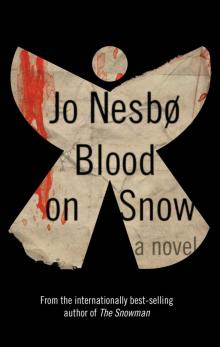 Blood on Snow: A novel
Blood on Snow: A novel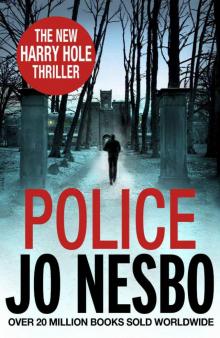 Police: A Harry Hole thriller (Oslo Sequence 8)
Police: A Harry Hole thriller (Oslo Sequence 8) Doctor Proctor's Fart Powder: The Great Gold Robbery
Doctor Proctor's Fart Powder: The Great Gold Robbery Bubble in the Bathtub
Bubble in the Bathtub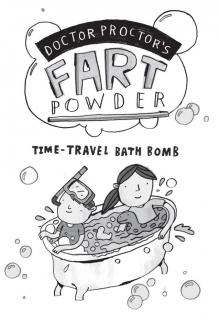 Doctor Proctor's Fart Powder: Time-Travel Bath Bomb
Doctor Proctor's Fart Powder: Time-Travel Bath Bomb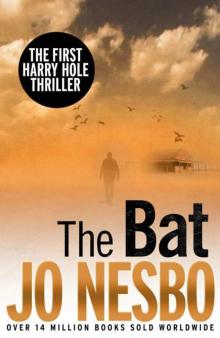 The Bat
The Bat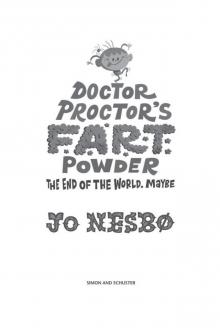 Doctor Proctor's Fart Powder: The End of the World. Maybe.
Doctor Proctor's Fart Powder: The End of the World. Maybe.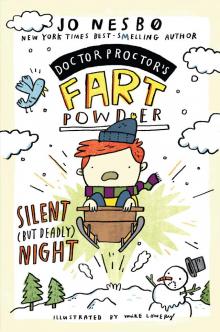 Silent (but Deadly) Night
Silent (but Deadly) Night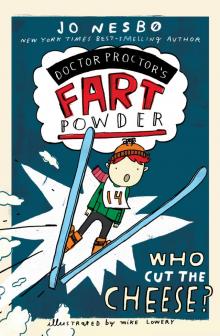 Who Cut the Cheese?
Who Cut the Cheese? Headhunters
Headhunters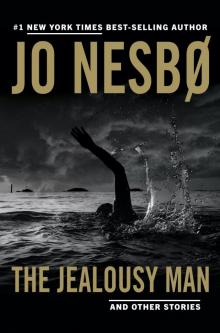 The Jealousy Man and Other Stories
The Jealousy Man and Other Stories Harry Hole Mysteries 3-Book Bundle
Harry Hole Mysteries 3-Book Bundle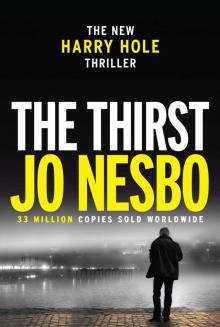 The Thirst
The Thirst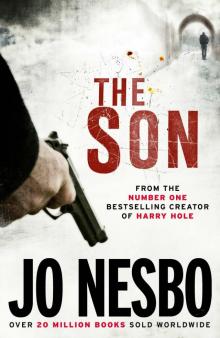 The Son
The Son The Redeemer
The Redeemer The Kingdom
The Kingdom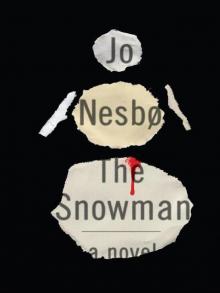 The Snowman
The Snowman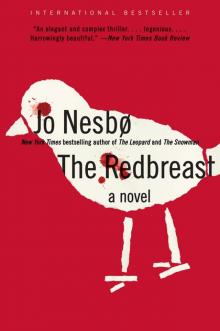 The Redbreast
The Redbreast Phantom
Phantom Macbeth
Macbeth The Leopard
The Leopard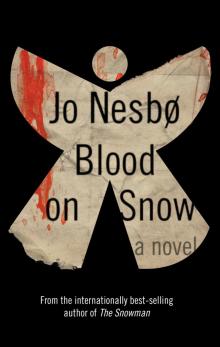 Blood on Snow
Blood on Snow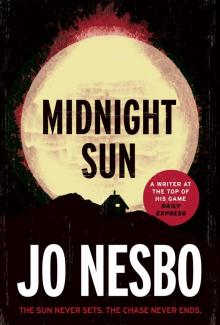 Midnight Sun
Midnight Sun The Redbreast (Harry Hole)
The Redbreast (Harry Hole)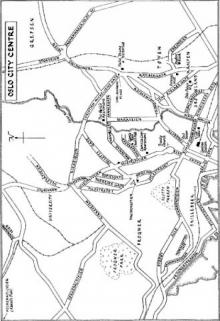 The Devil's Star
The Devil's Star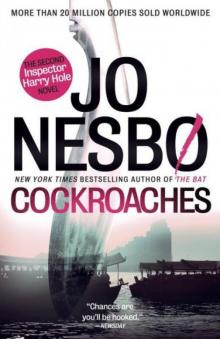 Cockroaches
Cockroaches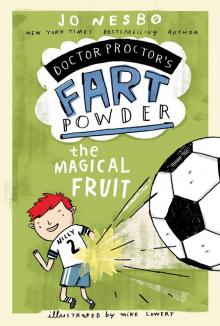 The Magical Fruit
The Magical Fruit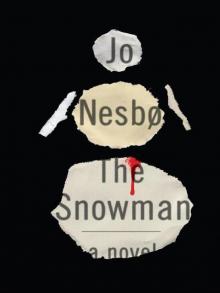 The Snowman: A Harry Hole Novel
The Snowman: A Harry Hole Novel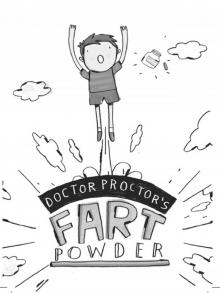 Doctor Proctor's Fart Powder
Doctor Proctor's Fart Powder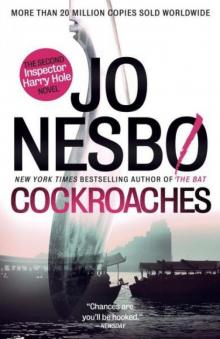 The Cockroaches
The Cockroaches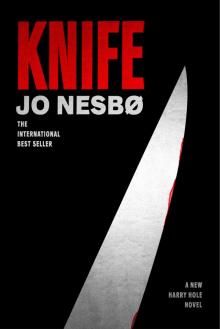 Knife
Knife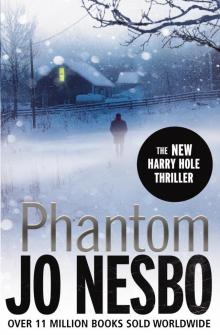 Phantom hh-9
Phantom hh-9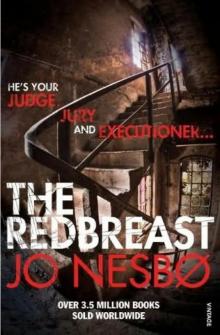 The Redbreast hh-3
The Redbreast hh-3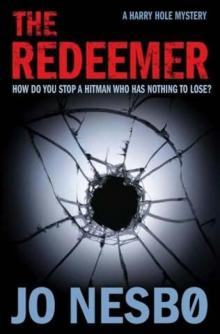 The Redeemer hh-6
The Redeemer hh-6 The Leopard hh-8
The Leopard hh-8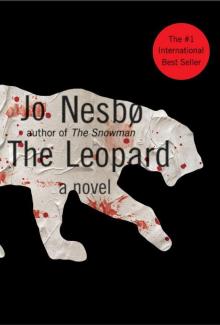 The Leopard: An Inspector Harry Hole Novel
The Leopard: An Inspector Harry Hole Novel The Great Gold Robbery
The Great Gold Robbery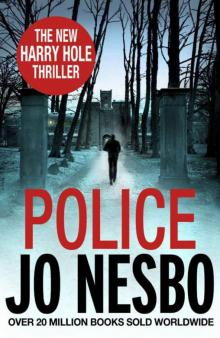 Police hh-10
Police hh-10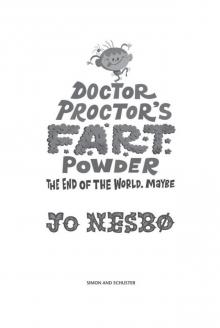 The End of the World. Maybe
The End of the World. Maybe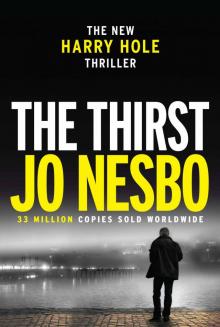 The Thirst: Harry Hole 11
The Thirst: Harry Hole 11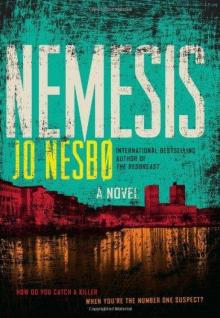 Nemesis - Harry Hole 02
Nemesis - Harry Hole 02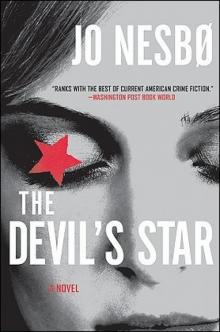 The Devil's star hh-5
The Devil's star hh-5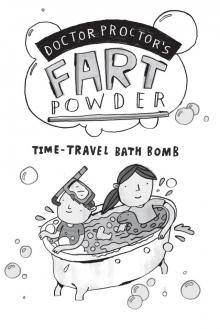 Time-Travel Bath Bomb
Time-Travel Bath Bomb